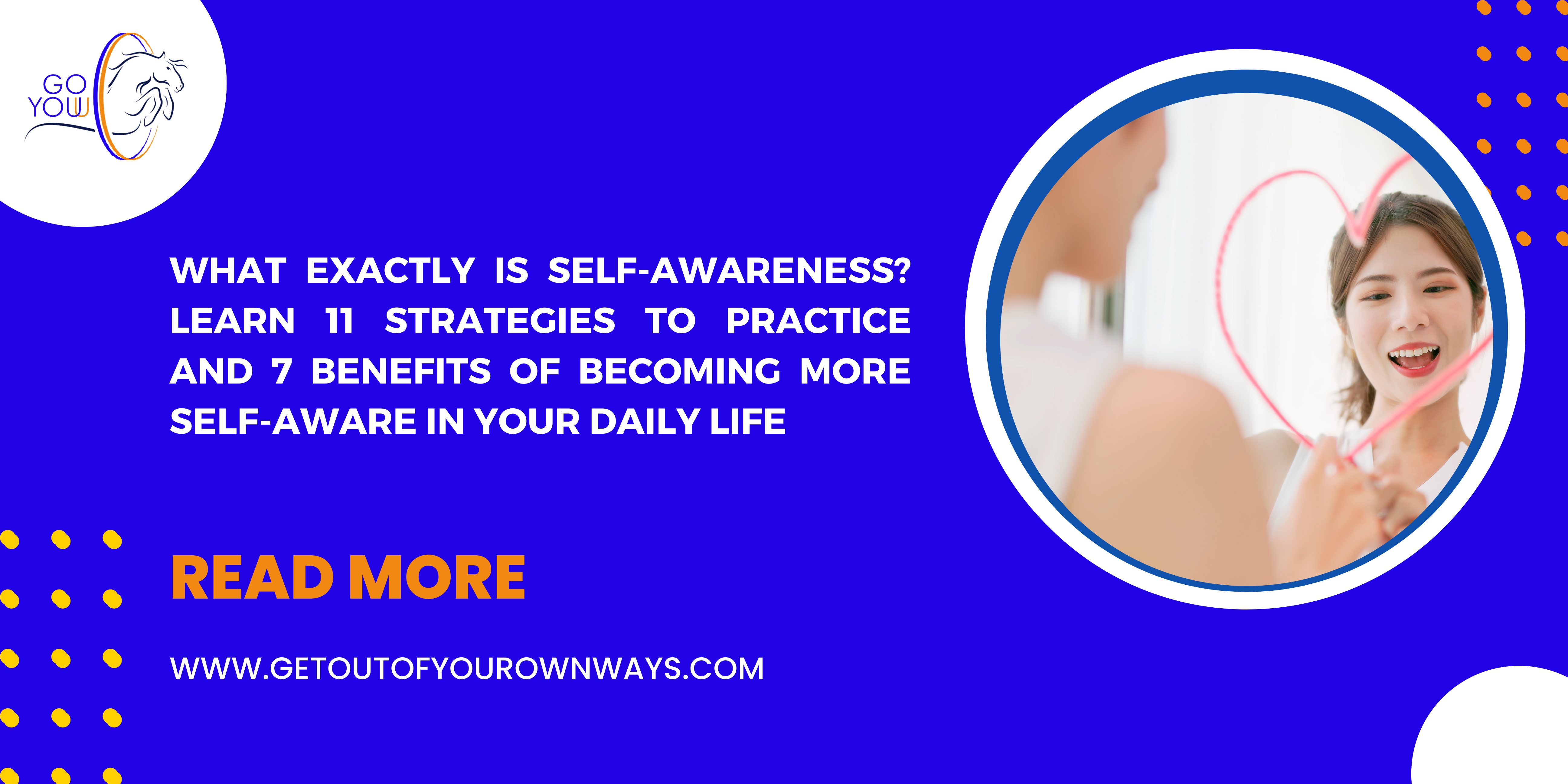What exactly does self-awareness mean? Of course, I am aware of who I am. I’m Sandra, I’m a life coach, I have one brother and one sister, I like vanilla ice cream and I dislike ……….
Self-awareness goes deeper. It is the capacity to recognise yourself as an individual separate from the environment and other people, and understanding your own thoughts, feelings, and sensations.
Self-awareness can take on several forms, including:
1. Physical Self-Awareness
This refers to being aware of your own body, including posture, physical sensations, and movements.
2. Emotional Self-Awareness
This involves being able to recognise and understand your own emotions and how they are affecting your thoughts and behaviours.
3. Cognitive Self-Awareness:
This involves being aware of your own thought processes, including thoughts, beliefs, and values.
4. Social Self-Awareness:
This refers to the ability to understand how you are perceived by others and how your actions and words impact others.
Self-awareness is considered a key aspect of human development. The development of self-awareness is thought to be a complex process that occurs gradually over time, starting in early childhood and continuing through adolescence and into adulthood. It is thought to be influenced by several factors, including genetics, early life experiences, and social and cultural factors.
However, it needs to be nurtured as we develop and evolve throughout life as there are so many distractions that take us away from our true selves leaving us feeling less sure of who we are.
Having a strong sense of self-awareness can lead to better decision-making, increased empathy and social skills, and a better understanding of your strengths and weaknesses. This capacity to reflect on your own mental states and experiences is a crucial aspect of cognitive functioning, and is related to a few other abilities, including the capacity for empathy and the ability to make decisions based on your own beliefs and values.
On the other hand, a lack of self-awareness can lead to difficulties in your personal and professional relationships, as well as an inability to effectively manage emotions and make positive changes in your life.
So How Do I Become More Self-Aware? Here are 11 Strategies to Practice Regularly.
1. Practice Mindfulness.
Mindfulness is a practice that helps you stay present in the moment and become more aware of your thoughts, feelings, and physical sensations. You can start by setting aside a few minutes each day to focus on your breath and pay attention to what’s happening in your body and mind.
2. Keep A Journal.
Writing down your thoughts and feelings can help you gain insight into your motivations, behaviours, and patterns of thought. You might also consider keeping a gratitude journal, where you write down things you’re thankful for, which can help shift your focus away from negative thoughts.
3. Engage In Self-Care.
Taking care of your physical, emotional, and mental well-being can help you feel more centered and focused, and thus become more self-aware.
4. Self-Reflection
Take time each day to reflect on your thoughts, feelings, and actions. Ask yourself questions like, “How am I feeling right now?” or “Why did I react that way in that situation?”
5. Be Curious About Yourself.
Try to understand your motivations, habits, and tendencies. Ask yourself why you do certain things and try to understand your patterns.
6. Challenge Your Assumptions.
Try to challenge your assumptions and beliefs about yourself and others. This will help you to broaden your perspective and to see things from different angles.
7. Seek Feedback From Others.
Ask people you trust for honest feedback on your behaviour, thoughts, and emotions. Ask trusted friends, family members, or coworkers for their honest opinions about your behaviour and how they perceive you. This can help you gain a more objective view of yourself and identify areas for growth.
8. Engage In Self-Reflection.
Take time to reflect on your experiences and think about how they made you feel and what you learned from them. This can help you understand your patterns of thought and behavior. Understanding your values and beliefs can help you better understand why you think, feel, and act the way you do.
9. Try New Experiences.
Trying new experiences and stepping outside of your comfort zone can help you learn more about yourself and gain a new perspective on life.
10. Seek Therapy.
Talking to a mental health professional can be a great way to become more self-aware. They can provide a safe and supportive environment for you to explore your thoughts and feelings.
11. Practice Self-Compassion.
Be kind and understanding towards yourself when you make mistakes or face challenges. Self-compassion helps you accept your flaws and work on self-improvement.
Why Go To All This Effort? Here Are 7 Benefits of Self-Awareness
1. Enhanced Self-Confidence
Understanding your strengths and weaknesses can help to build self-confidence and reduce feelings of self-doubt. You will feel empowered.
2. Better Relationships
Being self-aware means you understand your own thoughts, feelings, and behaviors, and how they impact others. This can lead to better communication and stronger relationships.
3. Improved Decision-Making
By understanding your values and motivations, you are better equipped to make decisions that align with your goals and values.
4. Increased Emotional Intelligence
Self-awareness helps you to identify and regulate your emotions, leading to a better understanding of others and improved emotional intelligence.
5. Reduced Stress and Anxiety
Understanding your thoughts and emotions allows you to better manage them, reducing stress and anxiety levels.
6. Improved Mental Health
By being more self-aware, you can identify negative thought patterns and behaviors and work to overcome them, leading to improved mental health and well-being.
7. Improved Communication Skills
By being aware of your thoughts and emotions, you can communicate more effectively, leading to better relationships and improved personal and professional success.
Remember, becoming more self-aware takes time and effort, but the benefits are well worth it. By learning more about yourself, you can live a more fulfilling and authentic life.

